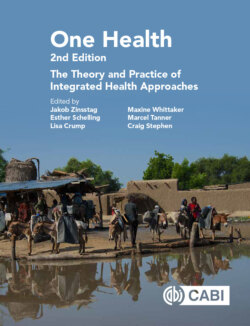Читать книгу One Health - Группа авторов - Страница 7
На сайте Литреса книга снята с продажи.
ОглавлениеEditors’ Preface to the Second Edition
Five years after the publication of the first edition in 2015, we have the pleasure and possibility to produce a second edition of One Health: the Theory and Practice of Integrated Health Approaches. The present updated and largely revised version is motivated by the numerous, worldwide and most relevant activities in research and public health action aimed at implementing and carefully validating One Health approaches and also to make One Health a global public health reality. We are truly overwhelmed to realize how One Health thinking and actions have spread in near-epidemic dimensions. It is gratifying to see how the initial focus on zoonotic diseases expanded rapidly to encompass social and cultural dimensions, including transdisciplinary participatory approaches co-producing transformational knowledge between academic and non-academic actors like communities, authorities and the private sector, as a central element for negotiation of the required multilevel cooperation under the One Health paradigm.
One Health embraces the environmental and ecological dimension of health, fuelled by climate change, pollution, waste management crises, the dramatic decline of biodiversity and extinction of wildlife species and plants and therefore makes significant contributions to the global attempts of reaching the Sustainable Development Goals (SDGs). Non-communicable diseases, gradually and rapidly dominating the worldwide burden of diseases, extend the scope of One Health by their linkages to nutrition, food safety and security as well as mental and spiritual health, animal-assisted interventions and the human–animal bond.
Increasing antimicrobial resistance (AMR) globally raises serious health and economic concerns. The main drivers and determinants of the spread and subsequent colonization of resistant bacterial strains between humans, animals and the environment are still mostly unknown. AMR is therefore not only a quintessential One Health issue, but One Health is an essential prerequisite for a systemic understanding of AMR acquisition and spread and for identifying, developing and validating effective control strategies.
The current most illustrative example for the need for integrated approaches to health is the spread of the new coronavirus (COVID-19). It demonstrates the global systemic consequences of poorly understood animal–human interfaces, a butterfly effect,1 in a likely zoonotic event which led to worldwide, serious economic consequences from reductions in trade and shortages of interconnected supply and production chains. Tragically, the prevailing shortsighted financial planning ignores the urgency of assessing the broader ramifications of public health and reduced funding for public health, particularly veterinary public health, an investment that would cost only a negligible fraction of the social and economic losses we witness today.
The insights gained from drastic examples like the recent COVID-19 epidemics along with the significant body of successful research and applications, as partly summarized in this second edition, encourage us ever more to insist on demonstrating the added value of integrated approaches and cooperation between related health sectors. It is only through integrative and iterative forms of cooperation that we can create the urgently required comprehensive policies to protect human and animal public health and preserve ecosystem services, a most powerful contribution to reduce and mitigate environmental and climate change.
It is an enormous pleasure for us to see the evolution of what initially appeared as a disconnected set of fragments and uncoordinated patchwork of thoughts, evidence and impacts to a coherent, well-profiled and unique quilt displaying an integrated view of health and well-being. The present edition attempts to carve out the key messages and to understand how scientific evidence can be translated into practices, academic teaching, institutional organization and integrated health policies resulting in a major impact in the pursuit to achieve the SDGs and, thus, better health and well-being within sustainable ecosystems.
We wish you a most stimulating read, and let us hope we can jointly tackle the remaining research, development and action agendas to which these contributions point. ‘We are not only responsible for what we do, but also for what we do not’ (Jean-Baptiste Poquelin, Molière, 1622–1673).
Jakob Zinsstag
Esther Schelling
Lisa Crump
Maxine Whittaker
Marcel Tanner
Craig Stephen
29 February 2020
Notes
1 In chaos theory, butterfly effects are small initial changes, which result in large effects at a later stage (Henri Poincaré, Paris, 1854–1912).
